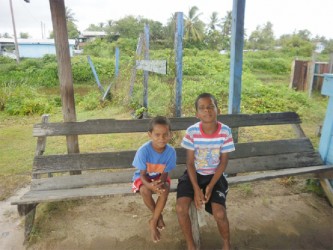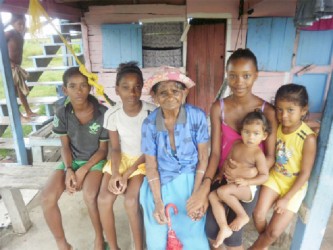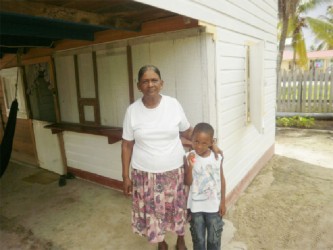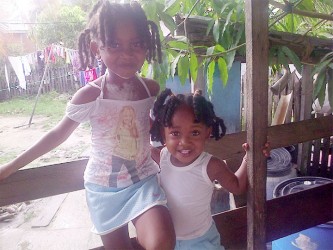Story and photos by Kenesha Fraser
“Westbury is the best village on the whole Essequibo Coast,” is the sentiment of Juliet Lall, a resident since 1960. When approached by Sunday Stabroek ‘Auntie Julie’ was sitting in the hammock under her house preparing seasoning to flavour the food she was about to cook for her family. “I moved to this village in 1960 when I was just 15 years old. My family came to live here and here is where we build our foundation. This part was very bushy and it only had a couple of houses and few people use to live here. I can remember that we use to walk with our buckets to the ‘mother pipe’ at the end of the village to fetch water to drink, cook and wash. In those days we didn’t know what was electricity. All we deh know bout was wall and hand lamp.”
Auntie Julie added that she was a shy girl while growing up and avoided mingling with other villagers. “I finish school before I come here so I never went to school in this village. It have a primary school in the village now but when I came to live here, that school was never there. The school in Dartmouth is where people use to send their children in those days.”
Even though she complained about noise nuisance in the area, she said that she is quite happy living in Westbury. “Over the years, things get lighter, so I am happy living here. All of my children and grandchildren live right around and that makes me more glad because I get to see them every day.”


Westbury, described by residents as peaceful and quiet is situated between the villages of Bounty Hall and Dartmouth and is the home to less than 1000 people. Most of the people living there are involved in rice farming or are small business owners.
As we continued along the Westbury Old Road, we caught up with Vincent Persaud who owns a gas station, rice mill and variety shop in the village. “I have been living here since 1959 and when I first came here, there wasn’t any road. The place was not developed and was bushy. Only a few persons lived here at that time and as things began to develop, then the place got populated. There was no pipe water neither electricity. Persons use to get water from the well or they use to set barrels to catch the rain water; and for light, flambeaus or hand lamps were used.”
Persaud who went to primary school up until Standard 5 said that he often helped his father in the rice fields as well as with the animals while growing up. Now, as the owner of 173 acres of rice fields, Persaud provides employment for residents of Westbury and neighbouring villages. “The village of Westbury is a peaceful place. We all live together as a family which is good. I must say that in 1963 after things started to develop, the public road was done and we now have a proper drainage and irrigation system.”
Sitting under a shed in her front yard, Ingrid Fernandes and her friend were catching up on the latest news but interrupted their session and readily provided information. “It has been approximately 16 years since I’m living in Westbury, and when I came to live in this village the area was bushy and muddy. There was one loam road and I can remember a big yellow bus use to take persons from one place to another. Things were hard in those days but it was nice living here.” Fernandes who is living in the part of Westbury called ‘Jonestown’ said that in the early years, persons in the village had formed a committee and started to plant cash crops and vegetables. “They were not living on this side of the road because here had very big bushes. They started to clear the land to plant and then they start to occupy this side too and they called it ‘Jonestown.’ Even though we say we living in Jonestown that is just a call name. The whole village is named Westbury.”


Fernandes recalled that as child living in the area, she especially enjoyed swimming in the canal with her siblings and friends. Now, residents are fortunate to have potable water, electricity, a telephone system and a good road. The refuse of the villagers is usually collected by the Puran Brothers Disposal Service.
There is also a primary school and a playpark in the village, while a health centre and secondary school is located just across the bridge in Dartmouth. Along the public road, then further into Jonestown, Sunday Stabroek caught up with 76-year-old Sanchari Duncan called ‘Auntie Darris.’ “Me live here so long me can’t even remember wah year or nothing when me come to live with meh husband. Me really from Hampton Court and meh husband was from Bounty Hall. We just come here and we start squatting. Was share bush deh in this part a Westbury and then them start call it Jonestown.”
Auntie Darris who now lives with her son and daughter-in-law enjoys spending time with her 46 grandchildren and 70 great grandchildren who all live close by. “I mek 11 children but only 7 alive now. After me and meh husband come and start squatting, the government eventually give we the land and all my children get a piece so all a them live right next to me and suh.” “By God’s Grace we all alive and me enjoy living here, but the only thing is that meh can’t see good now… but before I use to like mending my clothes and helping people to dig out coconut to mek oil.”
According to villagers, there is little crime in the area and even though each resident looks out for the other, there is great need for street lights. “We need street lights here. The place usually is dark and I believe that we should get some lights. I also think that in my village we need a better sports ground. We have a lot of young people in the village and I would prefer that instead of them being engaged in negative activities, they can do meaningful things. If the sports ground is improved, then the youths will be able to develop physically and to some extent mentally too, because they will have to use their brain. So that is the one most important improvement I would like to see in my village in the near future,” one resident said.









